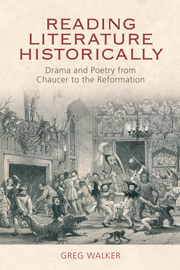Book contents
- Frontmatter
- Contents
- Acknowledgements
- Dedication
- Introduction: Literature and History: The Risks of Conversation
- Part I Drama
- 1 Early Tudor Drama and the Arts of Resistance
- 2 ‘To Speak before the King, it is no Child's Play’: Godly Queen Hester in 1529
- 3 Flytyng in the Face of Convention: Protest and Innovation in Lindsay's Satyre of the Thrie Estaitis
- Part II Poetry, 1380–1532
- Index
2 - ‘To Speak before the King, it is no Child's Play’: Godly Queen Hester in 1529
from Part I - Drama
Published online by Cambridge University Press: 05 October 2013
- Frontmatter
- Contents
- Acknowledgements
- Dedication
- Introduction: Literature and History: The Risks of Conversation
- Part I Drama
- 1 Early Tudor Drama and the Arts of Resistance
- 2 ‘To Speak before the King, it is no Child's Play’: Godly Queen Hester in 1529
- 3 Flytyng in the Face of Convention: Protest and Innovation in Lindsay's Satyre of the Thrie Estaitis
- Part II Poetry, 1380–1532
- Index
Summary
The anonymous Tudor Interlude of Godly Queen Hester provides a good case study of the kind of independent-minded, covertly assertive form of dramatic counsel that we looked at in the previous chapter. It suggests how far an interlude might both reflect and contribute to political debates, presenting demonstrably ‘alternative’ views on royal policy to that pursued and promoted by the crown or its chief ministers. In this way it is a fine example of the extent to which drama might be put to distinctly political work in the midst of controversy, while retaining its claim to be simply loyal counsel, a recreation designed to both inform and entertain its audiences. And it is also, as we shall see, a fine example of the limits of that form of political engagement as a means of achieving concrete political ends.
The play dramatises the events narrated in the Old Testament book of Esther from the moment when the Persian King Ahasuerus (‘Assuerus’ in the play) decides to seek a wife and chooses a Jewish woman, Hester (there is no reference here to his previous marriage to Queen Vashti), up to the execution of Haman, the thwarting of his plot to massacre the Persian Jews, and the latter's pardon and the restoration of their fortunes. (Again there is no mention in the play of the Jews' violent revenge upon their would-be persecutors described in the biblical source.)
- Type
- Chapter
- Information
- Reading Literature HistoricallyDrama and Poetry from Chaucer to the Reformation, pp. 36 - 62Publisher: Edinburgh University PressPrint publication year: 2013



